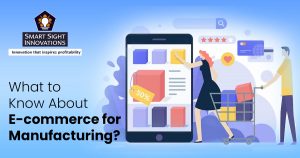 In the manufacturing industry, e-commerce indicates an organizational change from transactional to experience-driven commerce. Online parts and product sales are nothing new, but many of the old technologies now in use to make things available online are tedious or difficult to use. Manufacturers are searching for digital solutions that can help firms move from being traditionally product-focused to being more customer-centric.
In the manufacturing industry, e-commerce indicates an organizational change from transactional to experience-driven commerce. Online parts and product sales are nothing new, but many of the old technologies now in use to make things available online are tedious or difficult to use. Manufacturers are searching for digital solutions that can help firms move from being traditionally product-focused to being more customer-centric.
Why Do Manufacturers Need E-commerce?
Consumer behavior, specifically the shift towards digital channels, is driving unprecedented change in the industrial sector. Manufacturers that continue to provide primarily telephone, fax or email customer service run the risk of losing their consumers’ loyalty, especially as their lives and preferences are becoming digitally oriented.
Manufacturers stated in a survey that online sales channels contributed more than half of their overall revenue. E-commerce stands out from other digital solutions due to its ability to change how the manufacturing sector operates.
Strategizing e-commerce development can drive huge change In the manufacturing sector as it’s a platform that enables manufacturers to abandon their conventional business models and embrace a digitally connected ecosystem of customers, internal teams, data and systems that they can manage through a single platform. The option to order customized products, a simple checkout process and easy product selection were the three factors that B2B customers in the U.S. prioritized when asked about the most significant features of online shopping.
Additionally, 44% of B2B customers want an easy-to-use ROI calculator, 38% demand AR functionality and 33% anticipate customized portal content. Given the wide range of needs, a manufacturer’s greatest chance of providing the experience its customers want is through an integrated e-commerce approach.
According to statistics from 2021, it’s evident that manufacturers have embraced the shift to digital, with 98% of them implementing an e-commerce strategy. Furthermore, 42% of the manufacturers who have made investments in digital and e-commerce, acknowledged a boost in client relationships, as a result of these strategies.
How Does the Manufacturing Industry Benefit From E-commerce?
E-commerce has many advantages, including increased order accuracy, 24/7 access to order history and account management and more effective digital workflows. Some benefits of e-commerce for manufacturers are listed below.
1. Customized Catalog
As a company, you want to share your exclusive product catalog with your consumers. However, prices for these goods can change based on the buyer, market segment or other elements and you might be reluctant to post the pricing information online. With an e-commerce platform, you can cover both of these aspects by syncing your complete collection to your website and customizing prices as necessary.
Personalizing the catalog with product recommendations based on the requirements of your customers can help you boost sales conversions through cross-selling and upselling opportunities. A B2B web store allows for both price and product customization.
2. Visibility
Businesses in the manufacturing sector frequently see a lot of demand for replacement parts. An e-commerce platform linked to ERP will enable you to match the spare parts with the products that clients have purchased.
This makes cross-selling and upselling simple and effective and customers don’t have to put any effort into looking for related parts. This use of e-commerce in manufacturing enhances both customer service and productivity.
3. Ability to Configure Products
An e-commerce platform helps customers mix and match products that differ in shape, size and color. This implies that your clients can alter your items to suit their needs without assistance from your sales or support teams. Customers and your business both benefit from the time and effort saved.
4. Provide Your Entire Selection Online
As a manufacturer, you may have several products in your inventory and your customer may only purchase a small portion of these products. By including a B2B web store in your sales channel, customers get an idea about your whole collection.
They can be guided through the whole product catalog by tools like rapid search, search filters and search suggestions. Customers are now aware of the new products and also alternatives to their existing products.
5. Encourage New Customers
While purchasing products from suppliers nearly half of the customers use the internet to search for information and solutions. Thus, to maintain a competitive advantage it’s essential to have an effective online presence. The useful information you offer online can be made available to your clients via Google and other search engines. Strong SEO and online marketing capabilities can encourage new customers and help boost sales.
6. Brand Awareness
Nearly 58% of industrial manufacturer purchasers check the product before moving on to a brand. To increase the number of customers who are aware of your brand and the entire product line, you can SEO-optimize your e-commerce website to receive traffic from search engines.
Many e-commerce platforms have integrated SEO solutions included. For example, BigCommerce comes with pre-loaded SEO features that include optimized URLs, exclusive URLs, microdata, a content delivery network, as well as URL rewrites.
Even though the majority of the businesses are still just beginning their e-commerce initiatives, the benefits are obvious. Digital marketing backed by analytics can assist in finding new customer prospects and improve targets and product recommendations.
Modern B2B customers want to be in control of their online experience, which is why self-service options in addition to a transactional website are imperative. They prefer suppliers who give them a convenient and guided online purchase experience.
Whether it is keeping track of stock levels, product specifics or order history, the clients anticipate accurate information to rely on when interacting with your online store. By managing digital interactions with customers through websites and chatbots, the overall customer experience can be enhanced, while also boosting productivity, sales and revenue growth.












